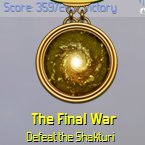tortugapower
Posts: 264
Joined: 12/17/2015
Status: offline

|
quote:
ORIGINAL: Erik Rutins
Thanks, it was a good listen overall and I appreciate the attention given to DW.
In the spirit of the podcast, I will also offer some comments. 
<snip>
Regards,
- Erik
Thanks for the feedback, Erik.
I will try to respond to this as best as I can. A note about the podcast crew for this topic, but I find this manifest on the 4X subreddit and pretty much everywhere that people know about Distant Worlds. I'm going to highlight this point because I think it's very good to keep in mind:
Distant Worlds is an extremely polarizing topic for 4X gamers.
Why is this? I don't know. I think it's because DW can be so successful at doing things right, and at drawing people in. It's a very immersive, realistic-feeling game. And, besides Aurora 4X, most games draw more from a Masters of Orion type game (something more like Civilization in space), whereas Distant Worlds went a different (and very appealing) route.
I believe when people "bounce off" [don't like] Distant Worlds, they have a strong reaction to it for two reasons. (1) They probably see bits and pieces of unique gameplay that they really like, but still for whatever reason don't like [other parts of] the game, and that's frustrating. (2) They hear all the praise that Distant Worlds gets from other people, and this evokes a stronger response for them to the negative. (I'm not a sociologist, so I can only speculate that maybe #2 is related to the 'vocal minority' effect.)
The Interface
When people then dislike DW and are compelled to have a strong reaction against it, the reason why the interface is so maligned (to an unfair degree, I agree) is that it's an easy target. "I don't like this game, let me look for reasons why!" ... "Oh, well, what the hell am I even looking at! This interface is garbage!" I'm going to ask Kirkus to come in and explain his viewpoint about the interface in more detail. I know that he has some experience with designing GUIs, and that might also explain his brutal stance against it.
To me, the interace is functional. It was mediocre for 2006 or 2010, and maybe people are just forgetting how old this game is. I'm not worried about it at all with regards to DW2, because I am confident it will be improved. I believe we spent way too much time talking about it on the podcast. We have a real-time text chat about the podcast while we're recording, and I mentioned something like "guys, too much on interface, time to move on". I think it's an easy fallback for those who want to criticize DW.
My own gripes with interface: Ctrl+right_click and then select from a menu is rough for ship actions. I think it would be better if the standard right-click for a sensible default (move/attack) -- more or less implemented, feedback to the user on order submitted could be better -- and then a hotkey for other options (e.g. press "b" with a ship selected and click on a planet brings up a quick "build what?" menu, just like the current Ctrl-click options). I do remember that ctrl-right_click ends up hurting the finger which must press Ctrl constantly haha. More generally, people will want to see an updated interface that "looks smoother". I don't know what that means, as I play and enjoy Aurora 4X so I'm completely fine with this one, but... maybe Kirkus can tell you. 
The Economy
I have almost no complaints about this. I don't think it's reasonable to have the level of abstraction so small that individual traders have wealth. The one thing I've seen mentioned that holds water is that blockading someone's resource increases the price of that good throughout the whole galaxy, based on supply/demand. I don't know the exact mechanics, but that's a fair point.
In my opinion, the more important thing is the immersion that having all those civilian ships around adds. This is mentioned so often, yet no other game has capitalized on it. It's the biggest selling point of DW as a 4X game.
From the development side, you'll just have to realize (and probably already do) how people will choose to perceive any apparent shortcoming of the game as a flaw in thinking or an oversight, rather than a design compromise/decision in response to a trade-off. I believe that the only way to combat this would be to have dev diaries explaining the decisions that go into the game throughout production.
I personally don't mind the lack of dev diaries, as I see it as a choice to dedicate that time on game development itself instead. Conversely, one great reason to do dev diaries is for the introspection it requires. I've found this in my own work, and I'm sure it comes as no surprise that taking some time to formulate your design decisions on a topic into words forces you to reflect heavily on it. Even doing a dev diary and then never publishing it would be a helpful exercise. But, "at what cost?" Time is finite, sadly. Maybe you could ask the devs from a game that did dev diaries whether they are worth the time?
I'll do some more reflecting on why people don't "get the magic" of the game. I have always thought it was because of the game's learning curve, and it's exactly this reason why I tried to formulate such an in-depth and well-organized tutorial for the game. In Kirkus' case, it's something else. I'm not convinced he has shared the true reason, if he has realized it himself.
Thanks for taking the time to listen to the podcast.
All the best,
Tortuga
< Message edited by tortugapower -- 10/17/2017 6:32:35 PM >
_____________________________
|
 Printable Version
Printable Version











 , but for instance there could be shortcuts tied to the windows you open, to quickly get a specific task accomplished. One game that comes to mind is Rimworld, in which many of the tasks on a command menu or sub-menu have a letter shortcut, so soon you memorize the frequently used sequences and you are able to quickly get to the "core" function in the third submenu - rather than clicking your mouse 5 times at various places in the opening menues and submenues. I realize this heavily depends on the game itself and the environment it is using, but it might be an idea for the big bag of ideas.
, but for instance there could be shortcuts tied to the windows you open, to quickly get a specific task accomplished. One game that comes to mind is Rimworld, in which many of the tasks on a command menu or sub-menu have a letter shortcut, so soon you memorize the frequently used sequences and you are able to quickly get to the "core" function in the third submenu - rather than clicking your mouse 5 times at various places in the opening menues and submenues. I realize this heavily depends on the game itself and the environment it is using, but it might be an idea for the big bag of ideas. 








 New Messages
New Messages No New Messages
No New Messages Hot Topic w/ New Messages
Hot Topic w/ New Messages Hot Topic w/o New Messages
Hot Topic w/o New Messages Locked w/ New Messages
Locked w/ New Messages Locked w/o New Messages
Locked w/o New Messages Post New Thread
Post New Thread